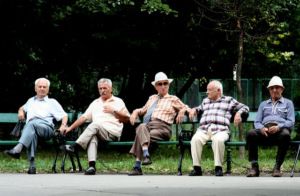News
Copenhagen getting older
This article is more than 9 years old.
Ageing population will put strain on the city’s economy

Park benches in Copenhagen will look more and more like this in the future (photo: Jon Rawlinson)
The average age of people living in the city of Copenhagen is about to start increasing.
Currently, the capital has the lowest average age in the country at 35.9 years old, but that is about to change.
From 2019 to 2027, the number of people over the age of 80 is expected to increase.
“We have had some good years where a falling average age has helped pay for the increasing number of children,” Copenhagen’s deputy mayor for health, Ninna Thomsen, told Metroxpress.
“In the coming years, there will be both more elderly and children in the city, which will put a strain on the city’s economy.”
New homes on the way
Frank Jensen, the mayor of Copenhagen, said the city is working hard to get ready for the increase in older residents.
“We have a greater need for home help in Copenhagen, because many older residents live in an apartment with no elevator and require extra help in everyday life,” said Jensen.
READ MORE: Less help for elderly patients
The mayor hopes to get 1,000 new assisted living residences built for the elderly by 2029.










































